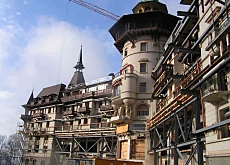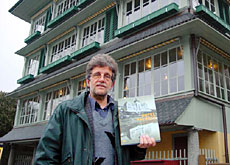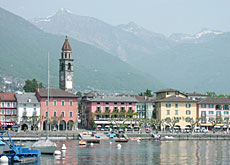Hotel owners pay high price for luxury

Despite stagnation in the tourist industry, members of Switzerland’s luxury hotel association are investing SFr1 billion ($840 million) in their future.
As some of the hotels undergo a complete makeover, there are calls for more to be done to respect the historical substance of the older properties.
The 34 members of the Swiss Deluxe Hotels reads like a who’s who of the industry, with many dating back to the 19th and early 20th century – tourism’s golden age.
As far as investments are concerned, the Dolder Grand Hotel in Zurich is leading the way, being renovated from the ground up at a cost of SFr250 million.
Another SFr100 million is being pumped into the Drei Könige (Three Kings) hotel in Basel, which is considered Europe’s oldest hotel founded in 1026.
Local businessman Thomas Straumann came up with the cash for the Basel hotel, only a few years after forking out SFr60 million to reawaken the Grand Hotel Bellevue in Gstaad from its slumber.
But Straumann has been outdone by Karl-Heinz Kipp, the self-made German billionaire with a soft spot for old hotels.
Mountain oasis
Kipp has earmarked a total of SFr120 million for his trio of properties: the Tschuggen Grand Hotel in Arosa, the Eden Roc in Ascona and the Carlton in St Moritz.
He’s enlisted the services of star Swiss architect, Mario Botta, to build a new “mountain oasis” spa at the Tschuggen and upgrade the facilities at the Eden Roc.
Straumann and Kipp are not alone. The majority of the Swiss Deluxe Hotels are in private hands. In many cases, the owners are wealthy entrepreneurs seeking prestigious objects and not necessarily a return on investment.
The “hobby hoteliers”, as they have been dubbed in the Swiss press, are the only ones willing to invest in the costly restoration and renovation of grand hotels, of which Switzerland has more than its fair share.
In doing so, they are making a contribution to the preservation of Switzerland’s hotel heritage.
Strategic importance
“History and tradition are of strategic importance for [members of] the Swiss Deluxe Hotels,” Fiorenzo Fässler, head of the association, told swissinfo.
“The exclusiveness is found in the ideal combination of the traditional and functional. There has been a growing demand for authenticity,” he said.
However, conservator and Switzerland’s leading authority on heritage hotels, Roland Flückiger, warns that the restoration of the historical substance is often only skin deep.
“In quite a number of cases, it’s only the façade or a couple of representative rooms which remain historical,” he told swissinfo.
Raise awareness
Flückiger has called leaders in the hotel and tourism industry to a symposium in Lucerne on May 23 and 24 to raise awareness of the importance of Switzerland’s hotel heritage. He also hopes to win support from the industry for the creation of a hotel archive.
“Hotels in the four and five star bracket have to meet certain international standards and that leads to homogenisation, so all the furniture looks the same no matter what hotel you are staying in,” said Flückiger.
“The furniture is mass-produced in the Louis XIV style somewhere in the world, imported and placed in the rooms.”
But Swiss Deluxe Hotels’ Fässler says that “a careful balance has to be found between functionality and decor”, meaning that authenticity should not get in the way of contemporary standards.
And despite his criticism, Flückiger admits that many hotel owners have succeeded in carrying out faithful restorations without compromising modern comfort or convenience.
He says in most cases it is the private individuals or families running hotels who have managed this balancing act rather than the hotel chains.
He says the chains often have no regard for a country’s heritage, simply following international design trends. Others bail out when a property fails to live up to shareholders’ expectations.
Anonymous investors
The anonymous investors behind the Rosebud hotel group have been trying to pawn off their Swiss acquisitions, including the Bürgenstock hotels above Lake Lucerne and, most recently, the Schweizerhof in Bern.
Rosebud closed the Schweizerhof last month ostensibly for “renovations” but there are fears they will not open it again.
Flückiger says that Switzerland has the largest concentration of heritage hotels in the world, estimated between 300 and 400. But there are not enough investors willing to underwrite the preservation of more than a couple of dozen of them.
The Grand Hotel Locarno is one example. History was written within its walls in 1925 when European leaders signed the ill-fated Locarno Pact, aimed at preventing another world war.
The hotel was spared the disfiguring renovations imposed upon many a hotel of its advanced age, but if it does not find a new owner with deep pockets soon, some fear it could fall victim to property speculators with little interest in preserving the past.
swissinfo, Dale Bechtel
Members of the Swiss Deluxe Hotel association are investing SFr1 billion over the next three years in renovations and upgrading their facilities.
Many of the properties are grand hotels dating back to the 19th and early 20th century.
The announcement coincides with a call for the tourism and hotel industry to do more to preserve Switzerland’s hotel heritage.
A symposium will be held in Lucerne’s Palace hotel on May 23 and 24.

In compliance with the JTI standards
More: SWI swissinfo.ch certified by the Journalism Trust Initiative



You can find an overview of ongoing debates with our journalists here . Please join us!
If you want to start a conversation about a topic raised in this article or want to report factual errors, email us at english@swissinfo.ch.